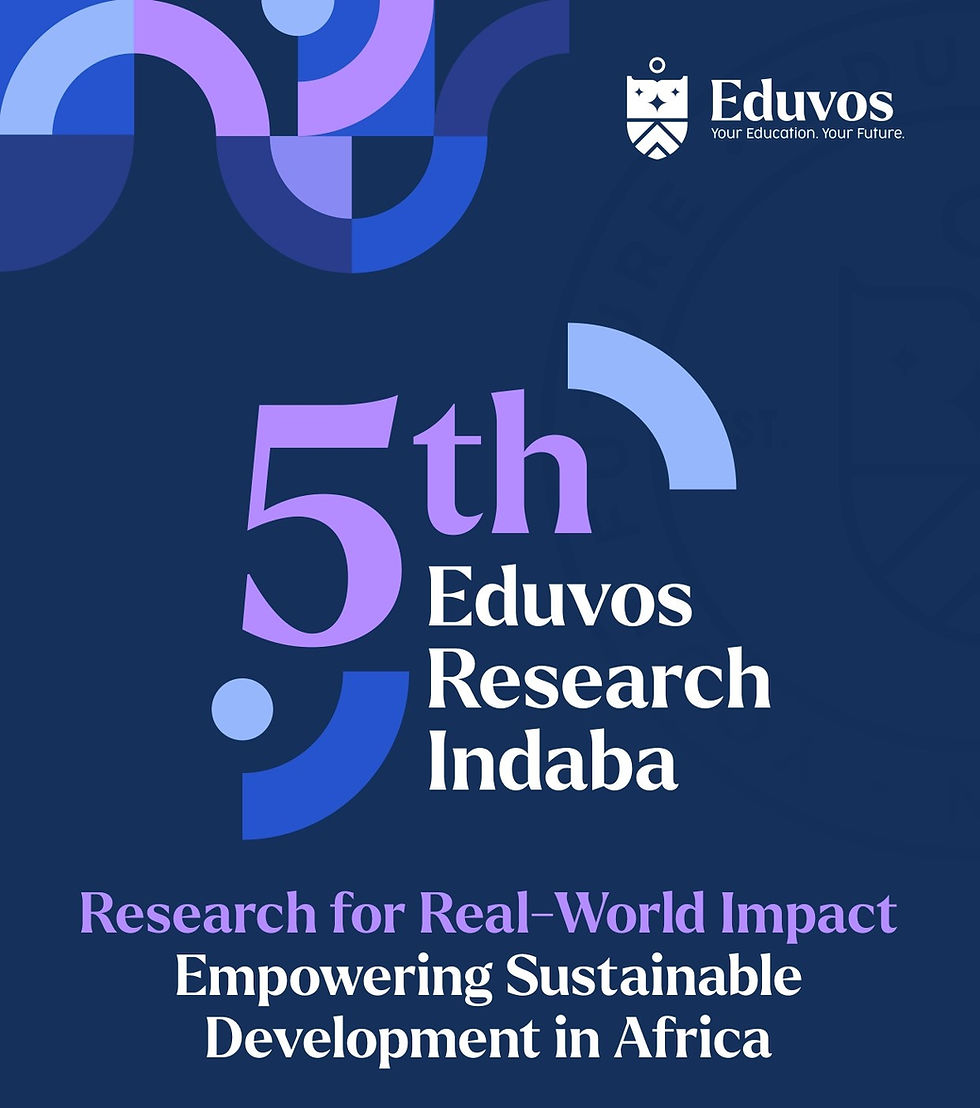The Ideas Driving Africa’s Next Chapter of Innovation and Impact
- BY MUFARO MHARIWA

- Nov 17, 2025
- 3 min read

Eduvos held its annual Research Indaba from 12 to 14 November 2025 at its Bedfordview Campus, bringing together scholars, students, and industry figures from across the continent. The three day gathering explored how technology, innovation, and sustainability can work together to drive real world impact in African communities.
Aligned with the revised Eduvos Research Agenda for 2023 to 2027, this year’s Indaba focused on the theme “Research for Real World Impact: Empowering Sustainable Development in Africa”. The event reinforced Eduvos’ commitment to transdisciplinary and community engaged research that responds to pressing societal issues while contributing to a future ready and equitable Africa.
The 2025 Indaba positioned research as a catalyst for transformation rather than a purely academic pursuit. Eduvos’ research philosophy centres on the belief that inquiry should lead to tangible progress, with outputs that strengthen communities, empower students, and support Africa’s broader sustainable development goals.
Across keynote sessions, panel conversations, and student showcases, the programme highlighted the intersection of technology, sustainability, and human development as essential drivers of Africa’s next chapter.

“Research must serve communities and society. It must empower, be intentionally inclusive, and enable change,” said Dr Nyx McLean, Eduvos Head of Research and Postgraduate Studies. “Our Research Indaba is a celebration of purpose driven inquiry that tackles real challenges and builds a future where innovation and ethics work together. It is about shaping Africa’s sustainable prosperity through the power of technology and human ingenuity.”
The event explored five core subthemes drawn from Eduvos’ 2023 to 2027 Research Agenda. These themes encouraged collaboration between disciplines and sectors:
Technological Transformation and Innovation – examining ethical innovation, AI, and emerging technologies designed for African realities.
Sustainability and Climate Adaptation – emphasising climate resilience, community led sustainability, and environmental justice.
Equity, Inclusion and Access – focusing on social equity, inclusive governance, and improved educational access.
Changing World of Work and Lifelong Learning – exploring future fit skills, digital literacy, and stronger links between education and employability.
Global Collaboration and Regional Resilience – promoting South South partnerships, innovation ecosystems, and cross sector collaboration.
Together, these themes reflected Eduvos’ guiding principles of transdisciplinarity, technological responsiveness, community engagement, curricular integration, and ethical sustainability.
Research Highlights From the Indaba
One of the standout moments of this year’s Indaba came from a collaborative study by Eduvos student Conquerant Lomberdi and Dr Banjo Aderemi, titled “Investigating Robotics in South African Healthcare”. The research examined how robotics is being adopted in local healthcare systems, focusing on real experiences and outcomes in three hospitals.
Through interviews with healthcare professionals, the team found that South Africa is still in the early stages of robotic integration, but the results so far have been striking. Robotics has contributed to improved surgical efficiency, faster patient recovery, and a lower risk of infection. In more than 1 000 recorded cases, surgeries performed with robotic assistance have achieved a 100 percent success rate.
The primary barrier is cost. Hospitals often have to rent robotic systems due to their high purchase price, and even rented units require ongoing maintenance that raises operational expenses. Despite the challenges, the study shows clear potential for robotics to transform surgical care in South Africa.
Another compelling study came from researcher Lungelo Mtshali, who presented her work on early HIV diagnosis in rural areas using AI. Her vision is not to replace existing human systems but to strengthen them through AI powered tools that support early detection and intervention. Similar approaches are already in use in India and Kenya, where AI assisted diagnostics have improved access and accuracy in low resource settings. Lungelo’s work highlights how technology can reinforce, rather than disrupt, community centred healthcare.
Eduvos continues to strengthen a research culture that is open, collaborative, and responsive to real world needs. By embedding research into its academic programmes, the institution equips students to be co creators of innovation rather than passive recipients of information.
The institution’s future focused approach prepares graduates for an evolving world of work, combining fields such as AI, data science, sustainability, and ethical governance. This enables students to apply their skills meaningfully within their communities and across broader African development priorities.
From studies on AI ethics and sustainable infrastructure to work on social inclusion and policy reform, research at Eduvos remains grounded in community relevance and long term impact.
As Eduvos continues shaping conversations around sustainable development and technological progress, the Research Indaba stands as a reflection of this mission. It also serves as a platform for championing research that is purposeful, measurable, and genuinely aligned with Africa’s future
























































